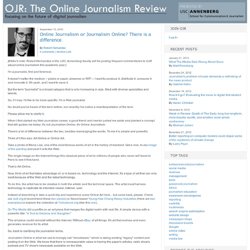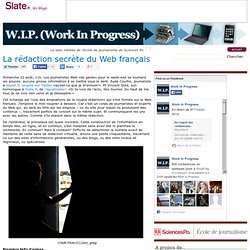

Online Journalism or Journalism Online? There is a difference. [Editor's note: Robert Hernandez of the USC Annenberg faculty will be posting frequent commentaries to OJR about online journalism this academic year.]

I’m a journalist, first and foremost. It doesn’t matter the medium — pixels or paper, airwaves or WiFi — I want to produce it, distribute it, consume it and innovate it. Oh yeah, and I want to save it. But the term “journalist” is a broad category that is only increasing in size, filled with diverse specialties and talents.
So, if I may, I’d like to be more specific: I’m a Web journalist. No doubt you’ve heard of this term before, but recently I’ve notice a misinterpretation of the term. Please allow me to clarify it. When I first started my Web journalism career, a good friend and mentor pulled me aside and planted a concept that still guides me today: It’s not Journalism Online, it’s Online Journalism. There’s a lot of difference between the two, besides rearranging the words. Think of it this way: Art Online or Online Art. That is Art Online. Paul Lewis to head new Guardian special projects team.
The award-winning Guardian reporter, Paul Lewis, is to stay at the newspaper to head up a newly-created multimedia special projects team.

Lewis was due to join the Times in September as a special correspondent but will now lead a new team of reporters at the Guardian, which is part of the group that publishes MediaGuardian.co.uk. Dan Roberts, who takes over as the Guardian's national news editor next month, will work with Lewis to recruit a small team finding new angles on breaking news stories, including using multimedia and crowdsourcing. Lewis used these techniques in his investigation into the details of the death of Ian Tomlinson at the 2009 G20 protest in London, for which he won reporter of the year at the British Press Awards in March.
His coverage of the protests also won him the Bevins Prize Rat Up a Drain Pipe award for outstanding investigative journalism. He joined the Guardian as a trainee in 2005 and went on to work at the Washington Post as a Stern Fellow in 2007. La rédaction secrète du Web français. Dimanche 22 août, 11h.

Les journalistes Web «de garde» pour le week-end se tournent les pouces: aucune grosse information à se mettre sous la dent. Aude Courtin, journaliste à lepost.fr, soupire sur Twitter «qu’est-ce que je m’ennuie!». Et Vincent Glad, son homologue à Slate.fr, de l’apostropher: «Si tu vois de l’actu, fais tourner. Du haut de ma tour, je ne vois rien venir et je désespère.» Cet échange est l’une des émanations de la «supra rédaction» qui s’est formée sur le Web français. De l’extérieur, le processus est quasi invisible. Crédit:Flickr/CC//lori_greig Premiers faits d’armes La première fois que cette «supra rédac» émerge, en France, c’est, me semble-t-il, en novembre 2009, lors de la polémique autour de l’exacte date à laquelle la photo de Nicolas Sarkozy donnant des coups de pioche sur le mur de Berlin a été prise. Adrénaline en commun La collaboration entre journalistes n’est pas nouvelle.
Technologie au quotidien Synchronisation des flux, des infos, des contacts.